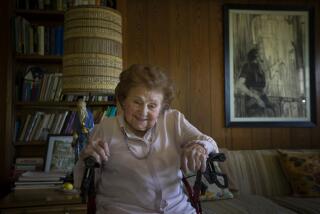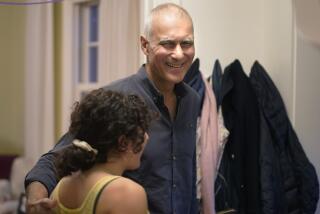Still Mighty at 90 : Anton Burg is Lauded for His Science as Well as His Humanity
- Share via
That wasn’t another Nobel Prize being announced Friday at USC as a happy crowd surrounding veteran chemistry professor Anton Burg pumped his hand and offered congratulations.
Burg was winning something even more precious to a 90-year-old-- admiration from those who have never forgotten him, or his effect on their lives.
During three-quarters of a century in the lab, Burg pioneered research that led to development of Teflon and plastic polyethylene. The 10 years he headed the USC chemistry department are credited by officials for making the place attractive to scholars such as Prof. George Olah, who won a Nobel Prize announced Wednesday.
Always the individualist outside the lab as well as in, Burg has never driven a car. For half a century, he has bicycled around Los Angeles, pedaling to research seminars and classroom lectures and waving away offers of rides from students and colleagues.
So it was fitting that friends and scientists who came from as far away as England started an all-day science symposium and birthday celebration in Burg’s honor by cheering him as he pumped his 21-speed bike onto campus Friday.
“That’s Anton,” University of Sussex chemistry professor John Nixon said with a laugh as his mentor braked to a stop outside the hall where the daylong discussion of boranes and fullerenes, phospha-alkynes and icosahedral metallacarboranes was about to get under way. “Always enthusiastic.”
It was Burg’s enthusiasm for academic research that steered Nixon into his own career when he was doing postdoctoral work here in 1960, recalled the British professor. Similar testimonials would be given all day long among the more than 100 scientists and scholars attending the Burg Symposium.
Between lectures, scientists swapped Burg stories, reminding each other of the important discoveries that had come from the old man’s test tubes over the decades. They talked of how one of Burg’s theories laid the groundwork for one of his colleagues to years later win a Nobel Prize. They recalled how a 1930s lab accident caused by exploding diaborane blinded him in one eye.
They laughed over Burg’s penchant for limericks and his unflagging interest in Lewis Carroll’s “Alice in Wonderland.” They talked of his proposals to take the boredom out of spectator sports by rewriting the rules for baseball, football and basketball.
“He had a real sense of humor, an ability to bring dry subjects to life,” said Peter Slota, a retired Riverside research chemist who studied under Burg between 1954 and 1958. “He still does.”
Retired USC chemistry professor Sidney Benson told how Burg prevented fire marshals from condemning an old Army barracks building that USC was using as a chemistry lab in 1946. When they complained that there was only one exit from the second floor, Burg jumped out a second-story window.
“He landed on the ground down below and yelled out, ‘See, that’s all there is to it,’ ” Benson recalled. “The Fire Department approved the lab for use. The rest of us were ready to lynch Anton--we were hoping they’d get rid of the old barracks. We ended up using them for another 20 years.”
Arthur Adamson, another former chemistry professor, recounted how Burg once pedaled 22 miles to attend a Christmas party at Adamson’s home. “Nobody thought it was odd that he did that. But we thought it was an exceptional effort for a party,” Adamson said.
Burg, who never married, seemed to enjoy talking about bicycles as much as talking about boron hydrides--one of his research specialties.
“I’ve gone through eight bikes,” explained Burg, who quit teaching in 1974. “Of course, three of them were stolen.”
He discussed his love of verse and how humor can be used to help teachers and students “grow together.” He recounted his very first days at USC in 1939, when he was tapped to jump-start a science department that “was only one step ahead of alchemy”--in the words of one official.
“He single-handedly created the department of chemistry,” acknowledged Prof. Philip Stephens, the department’s current chairman. And the work that on Wednesday brought a Nobel Prize to Olah “was built on the foundation” that Burg laid, Stephens added.
According to Olah, Burg “never got the recognition I believe he deserved.” He said Burg was puzzled why he was being honored on his 90th birthday.
“He said it would probably be more appropriate 10 years from now,” Olah said. “Then Anton looked at me and added, ‘Well, maybe all you fellows won’t be around then.’ ”
Another Nobel laureate, chemist William Lipscomb of Harvard University, was among those giving lectures during Friday’s seminars.
But Burg was the person that Ryden Richardson, a 73-year-old retired research scientist from Whittier who studied under Burg in the early 1940s, wanted to see again.
“I came here today out of appreciation,” Richardson said. “And love.”







